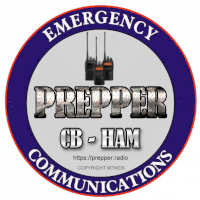
EmComms Prepper Radio
Welcome to Prepper Radio, an extension of EmComms Org. WWW.EMCOMMS.ORG
Prepping can help you survive a drought, fire, flood or solar event, economic depression, loss of a job, civil unrest, national conflict. Basically anything that disrupts your food resources and decreases your ability to obtain foods and feed yourself and family.
Transceivers: CB Radios, GMRS Radios, HAM Radios.
Receivers: Emergency Solar Handcrank Radios, Shortwave Portable Radios, AM/FM Portable Radios ...
If you are able make sure that you have a radio that covers the 2-meter band and 70-CM ham bands, these types of radios will usually cover 136-174 MHz & 400-480 MHz FM, where you can find everything from local fire and police, weather radio, and of course the ham bands and repeater networks that you will utilize to communicate locally or regionally through repeater networks that are linked to other areas of the country.
You can monitor Amateur Radio comms with out a license but ensure you 'DO NOT TRANSMIT' unless you have a HAM License from your country.
The basic or beginners amateur radio license exams are fairly basic and should be easy to pass if you read the training material and take a few practice exams before the actual test. Lack of on-air radio experience or ones own age are not barriers to obtaining an Amateur Radio License. If you want it just go for it!
The basic level of amateur radio license levels or entry level is more than ample to meet your needs as a Radio Prepper using the lower power settings. The antenna is an important key to reaching out to others in your geo location. A basic hand held 2-m 70-cm transceiver is ample along with a good antenna. A basic hand held mobile ham radio does not cost a fortune. Do ensure you have extra batteries however. I keep three extras charged up batteries plus the one in the unit itself.
A water proof bag of some type will help you keep the transceiver and batteries nice and dry. Yes a large Zip Lock type can be used in a pinch.
DO NOT leave a transceiver or batteries in the direct sun or in a hot area such as a car or window sill. Or near a heat source such as a campfire or cooking stove.
Seek out a radio club in your area if possible. These folks have the knowledge you may need for your geo area and conditions. Plus the emergency services you can call upon if needed.
M7WDX editor


